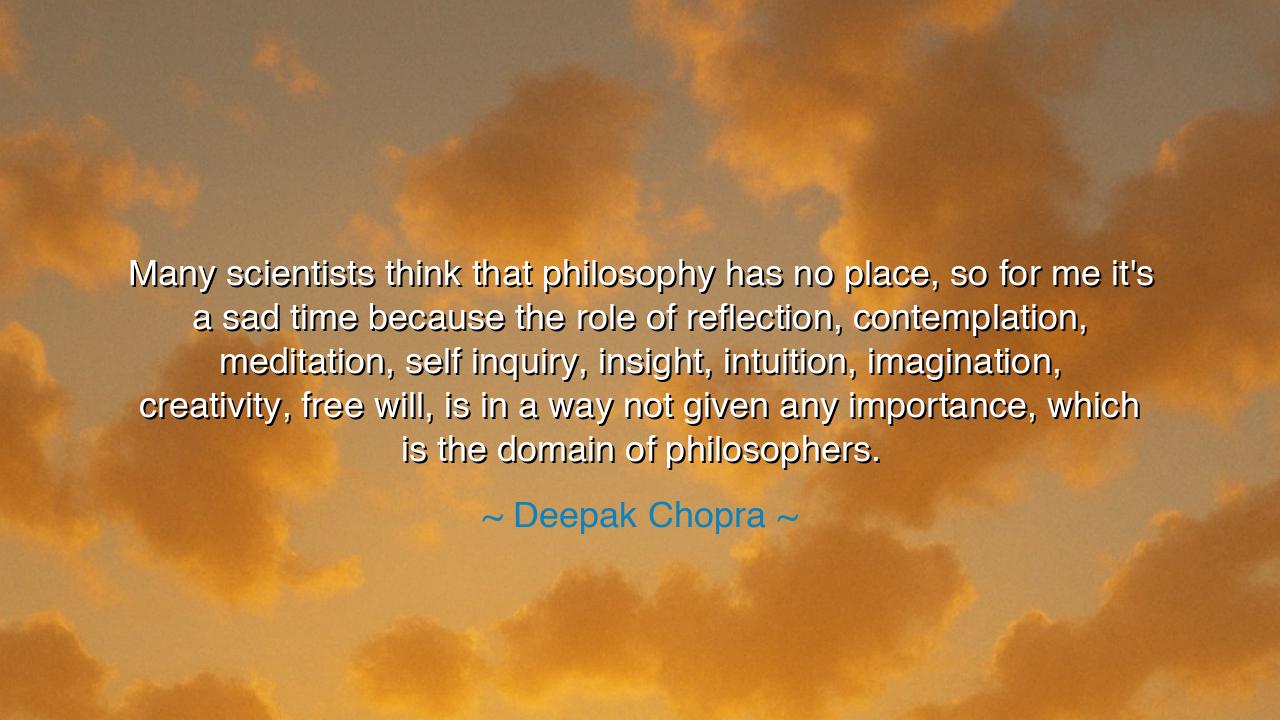
Many scientists think that philosophy has no place, so for me
Many scientists think that philosophy has no place, so for me it's a sad time because the role of reflection, contemplation, meditation, self inquiry, insight, intuition, imagination, creativity, free will, is in a way not given any importance, which is the domain of philosophers.






When Deepak Chopra said, “Many scientists think that philosophy has no place, so for me it’s a sad time because the role of reflection, contemplation, meditation, self inquiry, insight, intuition, imagination, creativity, free will, is in a way not given any importance, which is the domain of philosophers,” he was mourning not merely an absence of philosophy in science, but a deeper loss—the loss of wisdom in a world intoxicated with knowledge. His words are a lament for an age that measures the stars but forgets to wonder at their light, that splits the atom but seldom pauses to ask why. In these lines, Chopra stands as a guardian of the ancient balance between science and spirit, reminding us that when thought severs itself from reflection, it loses its soul.
From the dawn of civilization, philosophy has been the mother of all sciences—the fountain from which inquiry, mathematics, and art once flowed together as one. The first thinkers of Greece—Thales, Pythagoras, Plato, Aristotle—were not merely observers of the physical world, but explorers of the inner one. They understood that the outer cosmos mirrors the inner cosmos, and that without contemplation and self-inquiry, even the brightest intellect remains blind. But in the modern age, science, once born from philosophy’s womb, has turned away from its parent. It seeks the measurable and the material, dismissing intuition and imagination as unworthy companions. Chopra’s sorrow arises from this very separation—the divorce of knowing from wisdom.
The origin of this thought lies in Chopra’s lifelong bridge between East and West, between rational understanding and spiritual insight. Having walked both paths—the path of medicine and the path of mysticism—he speaks from experience when he warns that a purely analytical mind, untempered by reflection, can advance civilization but impoverish the soul. In the traditions of the East, especially in Vedanta and Buddhism, the pursuit of knowledge was never divorced from meditation and self-awareness. Science sought truth in the world; philosophy sought truth in the self. Together they formed the twin pillars of enlightenment. But when one pillar falls, the structure of meaning begins to collapse.
History bears witness to this. In the seventeenth century, René Descartes, seeking certainty, split mind from matter, thought from being. His method gave birth to modern science, but it also exiled consciousness from the field of inquiry. From that day onward, humanity learned to study the brain but forgot the mind, to observe behavior but ignore the soul. Yet even amid this shift, there have always been those who kept alive the flame of reflection—thinkers like Einstein, who declared that “imagination is more important than knowledge,” and Bohr, who admitted that every experiment is but a question asked by the mind of man. These scientists, unlike many of their peers, understood that insight and intuition are not the enemies of science but its hidden foundation.
In Chopra’s words, the “sad time” he speaks of is not a condemnation but a call to awakening. He invites us to remember that creativity, free will, and imagination are not luxuries—they are the essence of what it means to be human. Without them, the world becomes efficient but empty, clever but soulless. Science gives us power, but philosophy teaches us purpose. The microscope and telescope may expand our vision, but meditation and contemplation expand our consciousness. Only when the two work together can humanity rise into true wisdom—knowledge guided by compassion, understanding guided by humility.
Consider the example of Socrates, who, though he claimed to know nothing, became the wisest of men. His wisdom lay not in data or discovery, but in his unyielding devotion to self-inquiry. He turned his gaze inward, questioning every assumption, seeking not information but transformation. Through his method of dialogue, he ignited the flames of reflection in others—a mirror of what Chopra urges today. For in every age, when the mind grows proud of its knowledge, a voice must rise to remind it of the unseen mysteries that logic alone cannot grasp.
Therefore, let this teaching be heard by the generations to come: never separate reflection from reason. Honor the scientist who measures, but also the philosopher who asks. Cultivate not only knowledge but understanding; not only discovery but meaning. In your own life, make time for contemplation, for meditation, for the quiet act of listening to your own thoughts without judgment. In these moments, the mind and the soul become allies again, and imagination becomes the bridge between what is known and what is yet to be.
For as Chopra teaches, the world advances not by knowledge alone, but by wisdom—by that sacred balance of science and philosophy, of intellect and intuition, of the measurable and the mysterious. When reflection returns to the heart of inquiry, and imagination once again walks hand in hand with reason, then the age of sadness will end—and a new age of understanding will begin.






AAdministratorAdministrator
Welcome, honored guests. Please leave a comment, we will respond soon